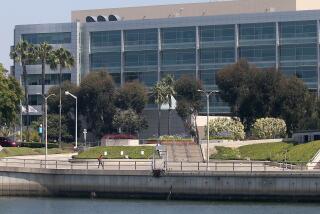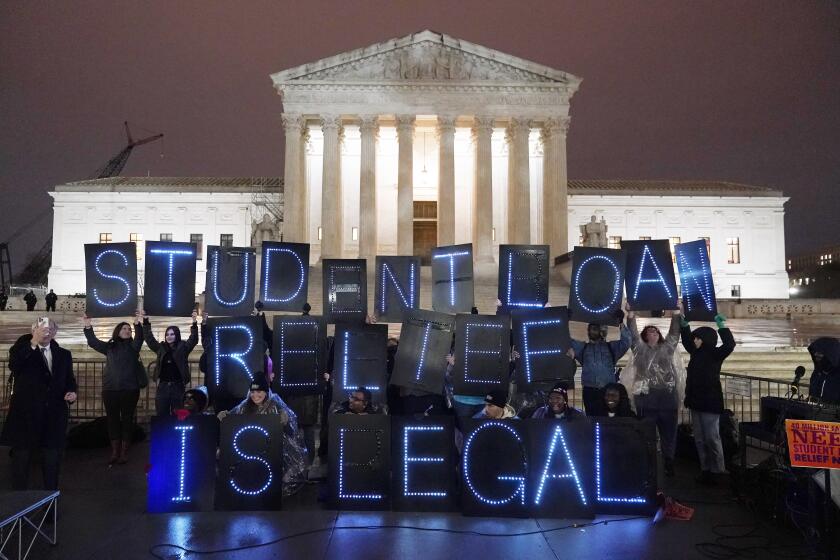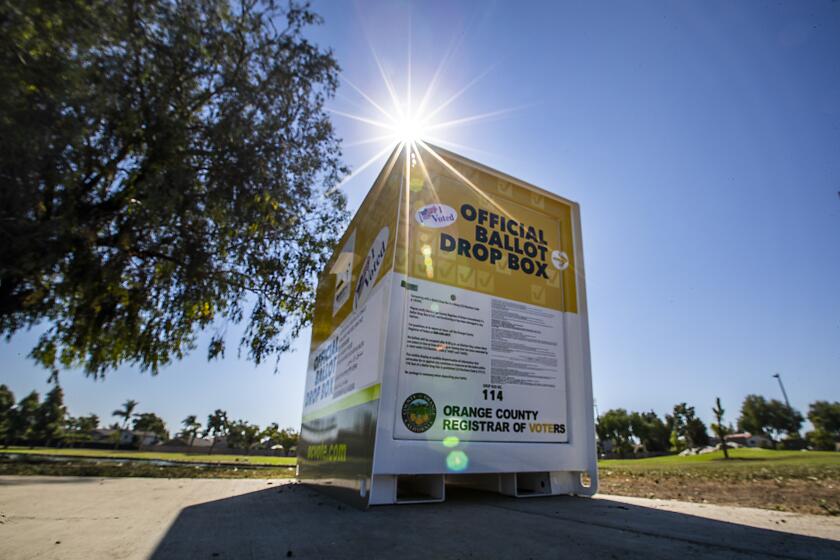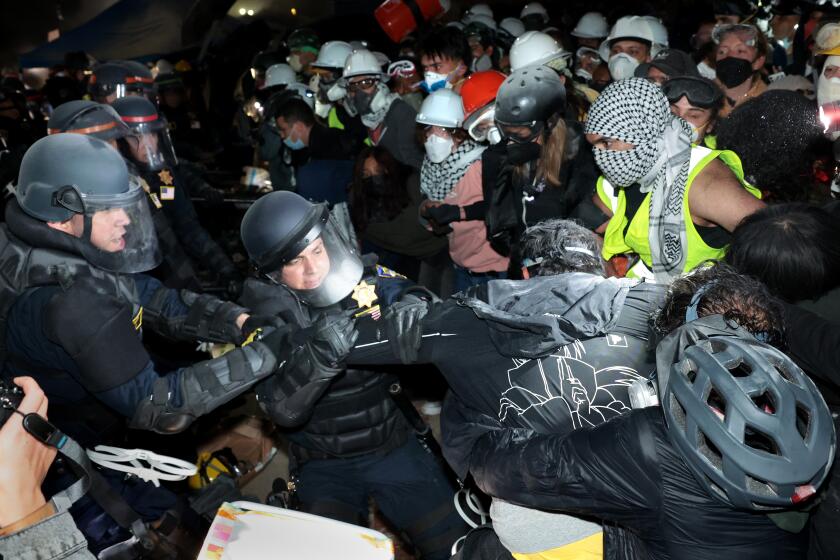USC admits to ‘troubling delay’ in warning about fraternity drugging, sex assault reports
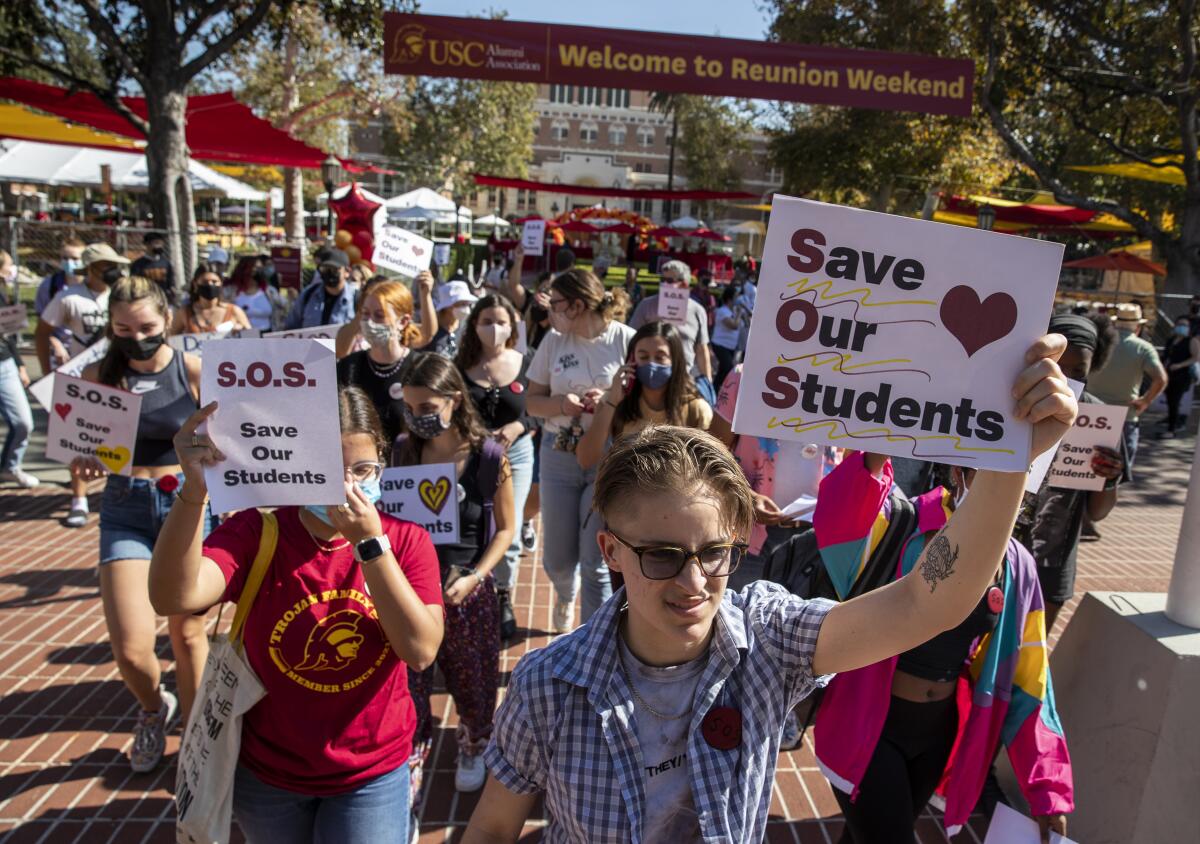
USC acknowledged Friday a “troubling delay” in warning the campus community about allegations of drugging and sexual assault by a fraternity last month as a rare faculty protest added to mounting criticism about the university’s handling of the crisis.
In a message to the campus community Friday night, USC President Carol Folt said that a university confidential reporting program received five to seven disclosures of possible drugging and possible sexual assault at a fraternity in late September. The information, however, was not shared with the campus community until Oct. 20, when the Department of Public Safety posted an alert that the university had received a report of sexual assault and reports of drugs being placed into drinks at the Sigma Nu fraternity house, “leading to possible drug-facilitated sexual assaults.”
Six students reported that the alleged drugging and assault took place at Sigma Nu on Sept. 24 and one student reported she was drugged Sept. 27 at an unknown location, according to the department’s daily crime log posted Oct. 21. The university subsequently announced it had suspended the fraternity.
Folt said the university decided to take the “exceptional step” of broadly sharing the information reported to the confidential program, called the Relationship and Sexual Violence Prevention Services — but did so weeks after receiving it.
USC said the confidential campus reporting service, without revealing student identities, shared a general summary of their allegations about Sigma Nu with university safety, health, student affairs and crisis intervention officials on Sept. 30.
“We are still investigating what occurred next, but there was clearly uncertainty regarding how to assess and process the information, and it was not immediately escalated” to other authorities, the university said in FAQs posted Friday night. The groups shared the information with the Title IX office and scheduled a meeting Oct. 18 to discuss the situation.
But during this time span another USC student reported she was sexually assaulted at the fraternity on Oct. 16.
“We now know that there was a troubling delay in acting on this information, and specifically in evaluating it for notification to the community,” Folt said in her letter. “This has highlighted for me the gray area in our processes when reports come into RSVP, and the challenge of marrying a highly confidential support service, which may have limited details, with the need to inform and warn the community.
“As president, I came to USC with the promise to confront what is wrong and lead the effort to fix what is broken,” she wrote. “As we learn more, there will be some things we can do quickly and others that will take more time. This is too important to not get right.”
Criticism over USC’s handling of the crisis continued to swell Friday, after the allegations sparked protests by a wide swath of campus groups. In a demonstration organized by faculty in the Gender Studies Department and members of Concerned Faculty of USC, protesters congregated Friday in front of the Bovard Administration Building across from Alumni Park where homecoming weekend check-in had begun. Dozens of faculty and staff were joined by students, calling on the administration to make changes in the wake of the allegations against Sigma Nu.
For some faculty, the allegations were the latest cause for concern and frustration with an administration they believe has been complacent in allowing for bad behavior.
“It’s literally the tip of the iceberg,” Aniko Imre, a professor at the cinema school said. She pointed to the mobilization of faculty that began when allegations of sexual assault emerged against George Tyndall, a former student health center gynecologist who is accused of abusing thousands of patients — a scandal that contributed to the ouster of President C.L Max Nikias and led USC to agree to a $1.1 billion settlement with those alleging abuse. Tyndall has pleaded not guilty to dozens of sexual assault charges.
“The new administration came in with very good intentions, and new energy. And I feel like the community, especially the faculty, gave them the benefit of the doubt and a great deal of support. And I think the general sentiment is that we’re not quite seeing the change that we had hoped for,” she said. “We [the faculty] can’t go on managing crises forever. There needs to be some vision of the new normal. And the new normal seems, at this point, a lot like the old normal.”
During the protest, dozens of faculty and students confronted Provost Charles Zukoski, asking him what the USC administration is doing in the aftermath of sexual misconduct allegations against fraternity members. Zukoski said that the university is not currently considering the abolition of fraternities and that the issue of sexual assault is not just a Greek society problem.
“I’m certainly not defending the fraternity and the Greek society,” he said. “All I’m saying is this is a deeply problematic issue for all of our culture and society — it isn’t just the Greek system on campus, it is spread throughout our society and it’s abhorrent.”
When pressed for further comment about the possibility of decertification of any fraternity at the center of allegations, Zukoski said such action would not eliminate the problem.
A university decertification — cutting off affiliation between the chapter and the university — does not necessarily dissolve the chapter. Theta Xi, for example, was unrecognized by USC in 2019 but still has a house on Greek Row.
“What’s interesting about the Greek system is that these are entities that are legally separate from the university. We don’t own the houses and the rules are set up and run by their organization,” he said. “What we could do is decertify, but that doesn’t mean that the organizations go away. Other institutions that I’ve been at, when we decertify a fraternity or a sorority, they can continue just fine throwing parties for their members. And so that’s one of the reasons why not just USC but other institutions continue to want to work with these groups, because at least if they’re certified by us, we can impose some rules — not a lot.”
Showing support for students was a major goal for Karen Tongson, the chair of gender and sexuality studies at USC and a member of the Concerned Faculty group. Tongson, who has been with the university for 16 years, organized a forum prior to the demonstration.
“USC’s legacy has been tarnished over the course of many years in its handling of sexual assault and sexual violence issues on campus,” Tongson said. “We, as faculty, felt like we needed to show up and be there for students to support them and to stand in solidarity with them when they felt betrayed, in many respects, by the university in its failure to hold those accountable for sexual violence and sexual harassment.”
In her message, Folt invited campus members to post any questions at QandA@usc.edu.
“Sexual assault is a serious problem at university campuses across the country, and it is a problem at USC,” she said. “When it happens, the entire university is impacted. We share in the anger at this violence and compassion for those who are harmed. It strikes at the heart of the community and the care we owe each other.”
More to Read
Sign up for Essential California
The most important California stories and recommendations in your inbox every morning.
You may occasionally receive promotional content from the Los Angeles Times.
